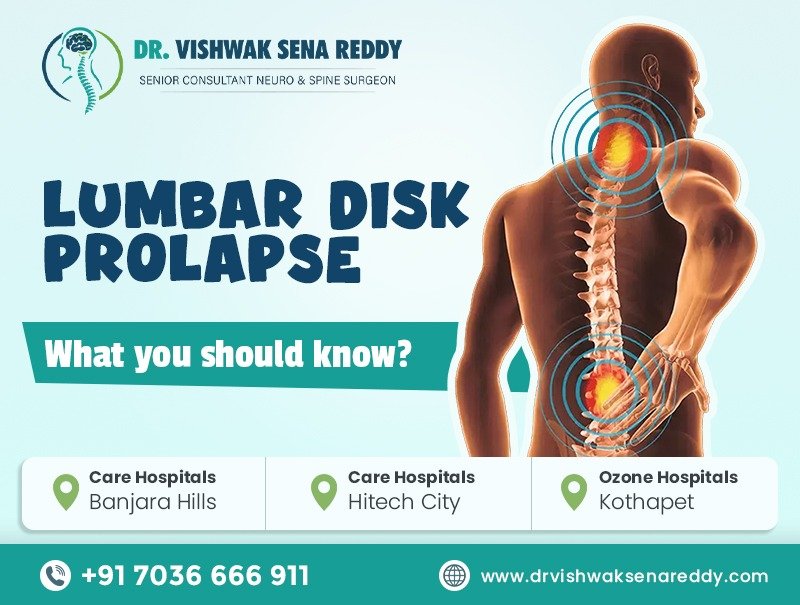Lumbar Disk Prolapse: What You Should Know?

A lumbar disk prolapse is a condition affecting the cushions called disks between the vertebrae. It is also known as herniated, bulged or slipped disk. A lumbar disk prolapse occurs when the jelly-like nucleus called nucleus pulposus gets pushed out from the annulus through a tear. This condition can occur in any part of the spine, but mostly occurs in the lower back. Based on the location of the disk herniation, it can cause severe pain, and numbness.
However, people suffering from lumbar disk prolapse can improve within weeks using non-surgical treatments. Surgery is very rarely used to treat a lumbar disk prolapse.
Common Signs of Lumbar Disk Prolapse
About 90% of people who have lumbar disk prolapse may not have any signs. However, the signs vary based on the location of the disk herniated and the nerve root it is pressing on. The following are the common signs:
- Sciatica
- Changes in bowel movements
- Leg muscles become weak
- Moderate to chronic back pain
- The back pain becomes even worse with actions such as cough, sneezing, standing, etc.
- Back muscle spasms
Along with lumbar disk prolapse, there are several conditions that can show the above signs. Hence, it is advised to visit a doctor for a diagnosis.
What Leads to a Lumbar Disk Prolapse?
A lumbar disk prolapse is mainly caused by natural wear and tear on the spine. This is called disk degeneration. During childhood and adulthood, the disks have high water content and they are very flexible. But as you get older, the water content reduces and the disks become less flexible. Due to this, the disk shrinks and makes it more prone to herniation. If any pressure is applied on the disk, the disk may bulge, and crack.
Any injuries that occur due to traumatic events such as accidents can also lead to a lumbar disk prolapse. If this condition is treated on time, it does not cause any chronic issues.
What are the Risk Factors for Developing a Lumbar Disk Prolapse?
The following are the risk factors of lumbar disk prolapse:
- Being overweight can exert pressure on the disks in the lower back
- Smoking can reduce the oxygen supply to the disk and can the disk can break faster
- Driving for a longer hour can put pressure on the disk
- Men between the age group of 20 and 50 have more chances of developing a disk problem
- Physical demanding jobs such as constant lifting, standing, bending, twisting, etc.
- Not practising regular exercise
Diagnosis of Lumbar Disk Prolapse
The doctor will ask you about your signs, and medical history and will conduct a physical examination. The doctor may ask you to lie down and make leg movements. This helps the doctor to know the exact location of your pain. A neurological exam may also be conducted to test your reflexes, walking ability, muscle strength, etc. If the doctor determines that some underlying condition is causing your signs or to know the nerve that got affected, he may use the following tests:
- X-rays
- CT scans
- MRI
- Myelogram
Treatment for Lumbar Disk Prolapse
The treatment for a lumbar disk prolapse begins with conservative and non-surgical methods such as:
- Bed rest for 2 or 3 days can help relieve your pain
- Maintaining a healthy weight
- The use of anti-inflammatory drugs can help you reduce your pain
- Reducing your physical activities such as bending, twisting, lifting, etc.
- Avoid movements that worsen your pain
- Physical therapy is effective at strengthening your lower back and abdominal muscles
- Use of muscle relaxants
- If medications and self-care do not, the use of cortisone injections around the spinal nerve can provide short-term relief from pain
Surgery is required in only rare cases. You need surgery if your condition does not improve with conservative methods and if you have the following:
- Loss of bladder control
- Numbness
- Facing difficulty to stand and walk
Endoscopic discectomy is the commonly used procedure to treat lumbar disk prolapse. Surgery involves removing the disk that is herniated along with some additional disc pieces that are putting pressure on the nerve.
Dr Vishwak Sena Reddy – An Experienced Neurosurgeon in Hyderabad
If you or your loved one is suffering from lumbar disk prolapse, then meet Dr Vishwak Sena Reddy today. He is a well-known neurosurgeon in Hyderabad for treating various neurological issues. He got trained and specializes in treating nerves in the spine and brain. He offers his services at an affordable price. To know more about the treatments offered by Dr Vishwak Sena Reddy, call us today.
